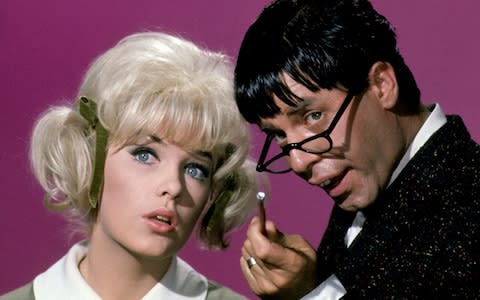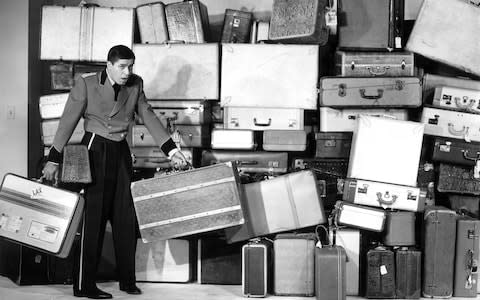Jerry Lewis would do anything to get a laugh – except play nice

Jerry Lewis meant different things to different generations. In 2016, a video of a Hollywood Reporter journalist attempting to interview the-then 90 year-old comic and enduring Lewis’s unblinking cold stare of contempt, open disdain for his questions, monosyllabic replies and cruel imitations of his nervous laughter, achieved viral notoriety among millennials.
The Jerry Lewis of the late 1940s galvanized the post-war American audience to almost Beatles-like hysteria. The comedy auteur of the Sixties made films that saw him praised as an artist and innovator. Moviegoers of the 1980s knew him for his dramatic work. For some, his greatest legacy will be his four-decade run as host of the Jerry Lewis Labor Day telethon that raised $2 billion for muscular dystrophy.
For others, it will be his authorship of a movie so ill-conceived and offensive he locked it away and ordered it to remain forever unseen. There will be those who remember him solely for his egotism and misanthropy. Some will bemusedly recall the God-like status he enjoyed in France.

Whatever your point of entry to Lewis’s century-spanning career, whether you were immediately infatuated or found his persona repellent, it’s unlikely you were unaware that his was a singular, probably never-to-be-repeated, talent. “I write about the the little guys,” Lewis once said. “I perform the little guys. But I don’t want to be one of them.”
Born in 1926, Joseph Levitch full evolved into Jerry Lewis 20 years later. As a teen, he had the stage name and a novelty vaudeville act in which he and the daughter of a New Jersey hotel owner lip-synced to hit songs. In 1946, Lewis met a young Italian crooner named Dean Martin. They were polar opposites. Martin was suave and self-assured; Lewis was skinny, nasal and manic. These were the perfect attributes to fuel a double act. Martin was passive; Lewis was active.
But in late 1940s America, to audiences comforted through the war years by the affable, reliable presences of Bob Hope and Jack Benny, the sight of Jerry Lewis’s unhinged, almost epileptic brand of slapstick was electrifying. ”I stuck the noodles up my nose while Dean nonchalantly sipped his tea,” recalled Lewis. “Someone was bound to notice us."

There was nothing Lewis wouldn’t do to get a laugh. Smash plates, hurl himself off stage, jump from the stage to the tables of the nightclubs that booked them. The more demented he got, the cooler and unaffected Martin remained. The chemistry between the pair rocketed them from being an in-demand live act to a big-screen career.
Watching some of the films in which the pair starred - titles like At War With The Army, Artists And Models and The Caddy - it’s difficult to reconcile these watered-down performances with their reputed onstage anarchy. But onstage and onscreen, their popularity continued to soar.
As is often the case in creative partnerships, especially duos where there’s nowhere to hide and unuttered grievances become magnified, each party felt his contribution was under appreciated by the other. “In order to maintain the Martin-Lewis relationship, I went through a ten -year period of lies,” says Lewis. They two called it quits in 1956, with Lewis proving enough of a solo box-office draw that he received an extremely lucrative contract from Paramount to write, direct and star in his own movies.

The studio’s faith was not misplaced. Lewis’s first film in which he exercised total control, 1960’s The Bellboy, was a dialogue-free display of sustained slapstick packed with elaborate set-pieces. It was a huge hit, as was the the more stylistically ambitious follow-up, The Ladies Man. But when critics and film obsessives, French and otherwise, launch into rhapsodies of hyperbole about the genius of Jerry Lewis, they use one example to illustrate their point.
In 1963, The Nutty Professor starred Lewis as bucktoothed, socially maladroit chemistry professor, Julius Kelp who, after swigging his own potion, transforms into an ice-cool, testosterone-fueled nightclub singer called Buddy Love. Some critics of the time saw the origin of Buddy Love as obvious, labeling the portrayal, “…one of the cruelest, nastiest, malice-aforethought swipes ever taken by one of a broken-up partnership at the other.”

Lewis has always denied using the film as a vehicle to exorcise years of built-up resentment over Martin’s role in his success. Even if you refuse to take him at his word, Lewis delivers transcendent comic performances in The Nutty Professor. Even audiences and critics who previously found him to grotesque and too eager to embrace his sentimental side, looked on the battle for the soul of Julius Kelp with new respect.
Jerry Lewis was such an inescapable pop culture behemoth in 1963 that the ABC network offered him an unprecedented multi-million dollar deal to star in a two-hour live Saturday night talk-and variety show. He was given total control of the show, to the extent that his specially-customized desk had a panel with which he could override the director and choreograph the cameras.

Hollywood’s El Capitan theatre, home of the new show, was renamed The Jerry Lewis Theatre, with the initials JL monogrammed in gold leaf on every door in the building. The first episode was a disaster. Microphones failed to function. Cameras refused to co operate. Lewis was rattled and combative. After being pre-emoted by the JFK assassination, the show was canceled after nine episodes. The previously unassailable star took out a full-page advert in Variety containing one word: Oops.
Lewis would make two more, unsuccessful, attempts to gain a toehold in the late-night talk arena over the decades. But, in 1966, he made an indelible mark in American TV history when he starred in the first of what would become a forty-year tradition. Jerry Lewis’s Labor Day telethon to aid muscular dystrophy. At the start of every September, Lewis would spend up to twenty hours on live TV, cajoling, crying and haranguing audiences to dig deep in their pockets to find a cure for the victims of the disease, who he called Jerry’s Kids.

While fellow celebs performed and manned the phones, the telethon was memorable for its annual climax when a sweat-clogged, emotionally spent Jerry would summon all his remaining energy and belt his way through a heart-rending version of You’ll Never Walk Alone.
In 1990, a group of disability rights activists took issue with the way Lewis portrayed them as objects of pity - in an essay entitled If I Had Muscular Dystrophy, Lewis, imagining himself with the ailment, wrote, “I may be a full human being in my heart, yet I am still half a person”- and formed a protest group called Jerry’s Orphans.
Lewis labeled the protestors "ingrates", but the fact that he had offended a segment of the population to whom he saw himself as a savior, turned the telethon into an uncomfortable combative affair where he would sound off in almost Trump-like manner about the unfair press he was receiving.
The Nutty Professor was the apex of Lewis’s career as star and director. Public tastes altered rapidly as the Sixties progressed, and Lewis seemingly overnight mutated into a quaint echo of a show business of a distant age. Dig through YouTube and you’ll find a clip of him co-hosting an episode of pop music show Hullabaloo with his son Gary, then a rising pop star in his own right.
The pair duet on the Beatles’ Help. In the moments, Lewis isn’t trying to be funny, the discomfort and resentment at being put in this undignified position oozes out of his every pore. (Also, a young Goldie Hawn is one of the backup dancers!)
In 1971, Lewis made his most-discussed, least seen movie. Many paragraphs have been devoted to The Day The Clown Cried, the story of Helmut Doork, the circus clown arrested by the Gestapo and given the job of putting happy smiles on the faces of Jewish children as he leads them laughing and singing into the gas chamber.

Harry Shearer, one of the few humans to have endured a screening of the film, said, "This movie is so drastically wrong, its pathos and its comedy are so wildly misplaced, that you could not, in your fantasy of what it might be like, improve on what it really is. Oh My God- that’s all you can say.”
As The Day The Clown Cried gained notoriety, even the pugnacious Lewis was forced to admit he slipped up. “I lost the magic,” he is quoted as saying. “No one will will ever see it because I am embarrassed at the poor work.”
To date, no one has, although compilations of footage and documentary about the making of the film have surfaced on You Tube. Reportedly, Lewis donated the movie to the Library Of Congress in 2015 on the condition that it not be screened for another decade.
By the 1980s, Lewis was old enough for his earlier works to be re-evaluated. Martin Scorsese said, “The films Jerry has made over the years, I still screen them. The visionary aspect, the staging, the clarity of the frame, composition and timing- they are timeless.” Scorsese was enough of an admirer to cast Lewis in 1982’s King Of Comedy. Many movies are ahead of their time, but few are as prescient of a world yet to come as King Of Comedy.
Seen through contemporary eyes, the story of a talent-starved stand-up who abducts and torments a talk-show host in order to become famous reads more like an instruction manual than a cautionary tale. Jerry Langford, the host abducted by Robert De Niro’s Rupert Pupkin and tortured by Sandra Bernhard’s Masha, is an opportunity for Lewis to unleash the parts of his personality he usually confined to offscreen life.

The rage, disdain and disgust that pour out of Jerry Langford are uncomfortable for the audience but clearly cathartic for the performer. Scorsese even allowed Lewis to direct a scene. Langford is interrupted by a fan who is in the middle of making a pay phone call. She asks for an autograph and then demands he get on the phone and chat to her cousin who is in hospital. When Langford demurs, the fan shrieks, “You should get cancer!” Scorsese recalled: “That actually happened to him. It isn’t necessarily funny, that scene, but it is the essence of the movie.”
If you were a British kid who grew up in the Seventies watching Michael Crawford cavorting on Some Mother Do ’Ave Em you were unconsciously influenced by Jerry Lewis. If you were an American kid who grew up in the Nineties watching Jim Carrey in Ace Ventura, you were unconsciously influenced by Jerry Lewis. He was hard to like but easy to love.
And he never cared if you did either: “Where do you think the public would be if I were working in a vegetable store?" Lewis once said. "They’d be waiting in line for another performer. I worked my ass off to get in their line of view. I don’t owe them a thing.”


